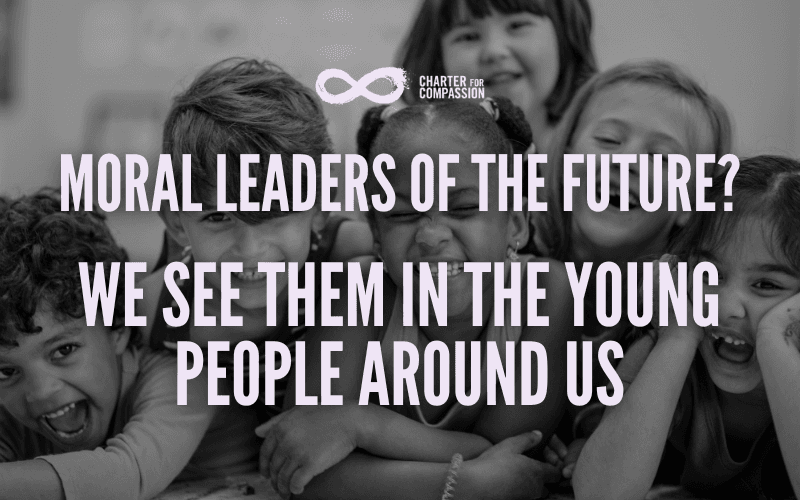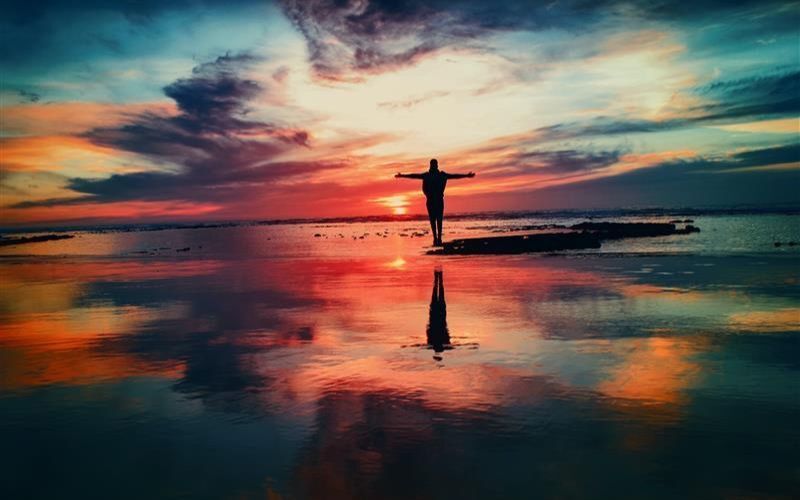
Marc Dullaert is interviewed by Monica Neomagus, Charter for Compassion Netherlands.
The Charter for Compassion Netherlands, part of the Movement of Mercy, spoke with Marc Dullaert, former Children's Ombudsman, founder and chairman of the Amsterdam-based international children's rights organization KidsRights Foundation. Dullaert met the global representatives of the international Charter for Compassion (to which the Charter is also affiliated) last year. This meeting led to a partnership and contact within the Charter's Global Youth Network. All the more reason to talk to Marc Dullaert about the story behind his special foundation.
‘Grabbed by the scruff of the neck.’
In conversation about how it all started, Marc says that he worked in the corporate world for a long time, then for a period in broadcasting, and also for some time for Foster Parents Plan. This work involved him in the fate of children worldwide. He was actually planning to return to the corporate world when, as he puts it, was ‘grabbed by the scruff of the neck’ while making a documentary in Sierra Leone.
After spending a night in the car with the camera crew due to a breakdown, he heard a woman crying heartbreakingly in the morning twilight. Her sick child, with whom she was on her way to a refugee camp, had just died. It affected him deeply. Back home, he founded KidsRights in 2003 together with his wife Ingrid Ikink.
The Tears of Mikhail Gorbachev
From the then starting foundation, projects were initiated in various places around the world in which the rights of children were central. A new idea was born when he saw a protest march on television sometime later against child labor in the carpet knotting industry in Pakistan. The march was organized by an 11-year-old Pakistani boy Iqbal Masih. "That boy should get the Nobel Peace Prize,” he said to his wife, and the idea never left him. An international Children's Peace Prize, that should be created and awarded to children who are committed to children's rights in a special way. Mikhail Gorbachev, the last leader of the Soviet Union and himself winner of the Nobel Peace Prize in 1990 for ending the Cold War, was at that time chairman of the annual world summit of Nobel Peace Prize winners. Marc spoke to him about this idea, which did not immediately receive warm support from the Nobel Committee in Oslo. When the conversation turned to the important lessons, we as adults can learn from children, Gorbachev became emotional. Shortly before, his wife Raisa had died and, he said, “I learned from my grandchildren that life is still worth living.”
The matter was settled. In 2005, the International Children's Peace Prize was launched in Rome, in the company of Nobel Peace Prize winners. Archbishop Tutu of South Africa (who also won this prize in 1984) became the highly committed and valued patron in 2008 and remained so until his death in 2021. The nomination period is currently open from KidsRights and this year, for the 21st time, the Children's Peace Prize will be awarded to a young person between the ages of 12 and 18.

The International Children's Peace Prize has since grown to become the world's most important youth prize and the 20th anniversary award ceremony, in 2024, reached no fewer than 3.8 billion people worldwide.
CHANGEMAKERS
On the occasion of the 20th anniversary, the book “CHANGEMAKERS” 20 stories that changed the world” was published. It contains the inspiring stories of the 20 ~ Children's Peace Prize winners. The book is for sale in bookstores, and in addition, KidsRights started the campaign “Get your copy for free if you are under 25.”
In the meantime, in 4 weeks time, no less than 1 million copies have been downloaded by young people from all over the world and the UN will also distribute the book digitally. Hopefully, even more young people will be inspired to become “Changemakers.”
Malala Yousafzai and Greta Thunberg
Two well-known winners of the Children's Peace Prize are Malala Yousafzai and Greta Thunberg. Last year, the 16-year-old Afghan Nila Ibrahimi won for her commitment to the rights of girls and women in her home country with the protest song 'Go to school.’ The song was picked up by media all over the world and spread via streaming platforms, reaching millions of people.Winners of the prize receive a scholarship and, in this way, get a worldwide platform to promote their ideals and goals for children's rights. From KidsRights, through a project fund of €100,000, investments are made in projects that are closely linked to the winner's field of work.

Changemakers in the century of the young
'Children are changemakers' is the credo of KidsRights.
Marc describes how the 21st century has become 'the century of the young' in his opinion. Where in the 19th century women's rights and the voice of women were high on the social agenda, and in the 20th century the Civil Rights Movement (with Dr. Martin Luther King Jr.) fought against racial segregation and for equal civil rights, the century has now dawned in which the great importance of the voice of young people is becoming clear to us. Forty percent of the world's population is under 24 years old. Because it concerns their future, their voices must be heard. "To achieve this, their rights must be respected, and we must ensure that they are able to shape the future of the world themselves, on a small and large scale," says Marc.
Three spearheads
In addition to the activities surrounding the Children's Peace Prize, the foundation, together with Erasmus University, organizes the KidsRights Index, the only global ranking that annually measures the extent to which children's rights are respected in 193 countries and they are committed to improving children's rights. As a third spearhead, the organization has the State of Youth, which is the first digital youth state to connect young people worldwide and offers them a platform (in the Netherlands and internationally in 61 countries) where young people are invited to set up their own chapter and work together on issues in their village, city or country that affect them. They not only take action locally with projects, but also make their opinions heard via panels. These chapters are led by and for children. In the Netherlands, for example, the lack of affordable and available housing for young people was recently put high on the public agenda via State of Youth Netherlands via a nationally initiated panel.
“Moral leaders of the future? We see them in the young people around us.”
The conversation turns to the state of the world at the moment. There is ample reason for gloom, but also for optimism. “Every day we see young people who are very concerned about the problems that exist. They feel closely involved in what is going on. At the same time, we have to conclude that there are currently few or no moral leaders on the world stage to whom they can lean. That disappoints them. But they do not sit around waiting and choose to become active themselves. In that sense, we see the moral leaders of the future rising up.” Whether it concerns climate issues, cyberbullying, refugee children, improvements in education, sustainable peace, help with trauma in conflict areas, or the situation of orphans; the young people that KidsRights meets think about what should happen and get to work.
“There is another important reason why we should cherish and support this,” Marc continues. “These days, we often talk about the mental health of young people and that there is a lot wrong there. Of course, this can have various complex causes. At the same time, I dare to say that young people who become active together on certain social issues and thus (re)take control of their own lives, also benefit from this. The sense of community and the sense of meaning that arises in this way offer strong counterforces to aimlessness, loneliness and depression. In this way, it cuts both ways.”
Young people can organize positive change from the bottom up together.
“All these little bits of good, will overwhelm the world” said our patron Desmond Tutu.
See also: https://www.kidsrights.org
Do not miss our Global Read on April 9 at 9 am PT with Marc Dullaert, Julius Dullaert, and Inge Ikin and their book "CHANGEMAKERS". Click/Tap here or the image below to learn more and register for this event!




